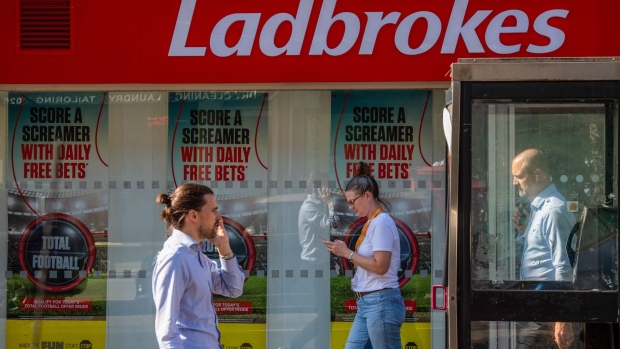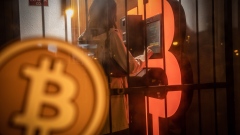Oct 14, 2021
DraftKings CEO Robins Looks to Score His Biggest Jackpot Yet
, Bloomberg News

(Bloomberg) --
It was the deal that begat all of DraftKings Inc.’s other deals. ESPN was looking for a way to capitalize on the growing popularity of daily fantasy sports and decided to sell an exclusive sponsorship. Jason Robins, co-founder and chief executive officer of the fledgling fantasy sports company, was ready to pounce.
As the bids kept rising, Robins flew alone to the Burbank, California, headquarters of ESPN’s parent, Walt Disney Co., and made his pitch. DraftKings reportedly agreed to spend $250 million on ESPN ads over two years, a sum that exceeded the company’s annual sales. That was enough to clinch the watershed 2015 pact.
Robins has been lining up partners and plastering DraftKings' name all over the sports world ever since. This week, the company landed online-betting agreements with the National Hockey League and Turner Sports, and agreed to buy a stake in online ticket seller Vivid Seats. Meanwhile, the lifelong sports fan and poker enthusiast is pursuing his biggest gamble yet — a $22.4 billion takeover bid for Entain Plc, British parent of storied Ladbrokes betting shops and other gambling businesses.
“Jason, throughout my experience, has been a guy who is willing to make bold moves in order to win,” said John Skipper, who led ESPN at the time of the 2015 deal and has partnered with DraftKings in his new media venture. “He’s very competitive. He’s long known where he wants to take DraftKings. Jason was not going to lose.”
Acquiring the profitable Entain will help DraftKings weather its costly drive to attract new customers in the U.S., provide international exposure and perhaps gain ground on industry leader FanDuel. DraftKings is expected to lose $1.4 billion this year as it continues to spend on marketing and expands its sportsbooks into more states.
“As a really good poker player, you take calculated risks,” said Jonathan Kraft, the son of New England Patriots owner Bob Kraft and an early DraftKings investor. The Entain offer “really ensures that when you wake up in five years and this industry is totally different, DraftKings will be one of the handful of really great companies that has survived.”
Robins declined to be interviewed for this story, citing the ongoing negotiations with Entain. But the 40-year-old entrepreneur clearly has bigger aims for the company he built into a major player in the fast-growing business of online gambling. DraftKings is expected to generate revenue of $1.3 billion this year, about double last year’s total, and has a stock market value of $20 billion. According to the research firm Eilers & Krejcik Gaming LLC, the company has a roughly 30% share of sports betting in the U.S., a business that has exploded in popularity since the Supreme Court lifted a federal ban on bookmaking outside of Nevada in 2018.
The son of a schoolteacher and an economics professor, Robins grew up in South Florida, rooting for the University of Miami Hurricanes. He studied sports scores as a kid and played in fantasy leagues, season-long contests where groups of friends pick imaginary teams consisting of real players. His career goal, according to his high school yearbook: “Get my MBA and get rich.”
In 2011, while working for an online printing company, Robins joined two co-workers, Matt Kalish and Paul Liberman, to found DraftKings, toiling on weekends and nights out of a spare bedroom in Liberman’s house. The idea, pioneered by FanDuel and others, was to offer daily fantasy sports contests — fast-paced, online versions of the old rotisserie leagues. The participants, complete strangers, could compete for real pots of money based on athletes’ performances, with DraftKings taking a percentage for managing it all.
But attracting players required constant promotion, forcing FanDuel and DraftKings into a cat-and-mouse rivalry, with each company competing to raise more money from investors to pour into marketing.
“Every year we were spending increasing amounts of money,” recalled Nigel Eccles, FanDuel’s co-founder and first CEO. “How do we spend five times as much as last year?” Competing against Robins, he once said, was “like being handcuffed to a lunatic.’’
Robins outmaneuvered FanDuel to acquire rival DraftStreet in 2014. Two years later, he tried to merge with FanDuel, but the U.S. Federal Trade Commission sued to block the deal as anticompetitive. Meanwhile, both companies battled opposition from casino operators and states attorneys general who argued that daily fantasy sports contests were really unregulated gambling.
Robins proved adept at parrying opposition to his business, in part by bringing in high-profile investors such as the Krafts, Dallas Cowboys owner Jerry Jones and 21st Century Fox Corp. Ted Leonsis, owner of the basketball’s Washington Wizards and hockey’s Washington Capitals, recalled meeting Robins at an NBA All-Star game. The pair connected over their love of sports and music, talking about the Beatles and collecting vinyl. Leonsis ended up investing in DraftKings through Revolution Growth, an investment firm he co-founded.
“Sometimes we deal with executives and founders who think they have all the answers, and the only time they call you is when they’re in trouble,” Leonsis said. Robins “really developed a good group of mentors, people that he can count on for advice. And we gladly give it.”
Thirty-two states have now legalized sports betting and opposition to fantasy sports has largely faded. Conventional casino operators are chasing the same business opportunities as DraftKings. Robins has used the company’s database of daily fantasy customers to expand into related and potentially much more lucrative businesses, including traditional sports bets, like who’s going to win Sunday’s big game, as well as online slot machines and blackjack.
“They’re one of the big reasons that the market is developing now,” said Soo Kim, chairman of Bally’s Corp., a casino operator with a large online presence. “They lifted the ceiling so that we can grow into it.”
DraftKings is also selling sports collectibles, such as autographs, identified as genuine through the use of digital markers known as nonfungible tokens.
But Robins faces new challenges.
With more companies pursuing the online betting opportunity, the competition has gotten fierce. FanDuel, which was acquired by Irish bookmaker Flutter Entertainment Plc three years ago, has taken the lead in U.S. sports betting with a 32% share of the market. Entain, through its BetMGM U.S. joint venture with MGM Resorts International, is now No. 1 in online casino games. And all of the companies are spending heavily to lure customers, offering free bets of as much as $5,000 to new players.
“The current strategy that most are taking, it’s just not sustainable,” said Jay Snowden, CEO of Penn National Gaming Inc., a casino operator that offers online betting through its partner, Barstool Sports.
Over the past two years, Robins has sought to fortify DraftKings’ business, buying sports betting technology provider SBTech and going public through a merger with a shell company to raise cash and have stock as currency for deals. In August, he announced plans to buy Golden Nugget Online Gaming Inc. for $1.56 billion, obtaining a casino brand appealing to nonsports customers.
If Robins convinces Entain’s board to merge, he’ll likely have to negotiate a settlement with MGM Resorts, which has exclusive U.S. rights through their joint venture. MGM’s own $11 billion offer for Entain was rejected as too low early this year, and it isn’t expected to make a higher offer. DraftKings’ stock market valuation allowed Robins to bid more aggressively, MGM CEO Bill Hornbuckle said.
“We trade off the bottom line, in cash flow,” Hornbuckle said in an interview. “He’s trading off the top line, the revenue side. The currencies are a little bit different.”
In an interview in February, Robins said he’d continue to look for deals, but said there wasn’t anything DraftKings desperately needed. Given what’s transpired since then, it’s clear he was behaving like a poker player protecting a hand.
“It’s kind of opportunistic,” he said of his acquisition strategy. “If the right thing comes along, you’ll see us act on it.”
©2021 Bloomberg L.P.























